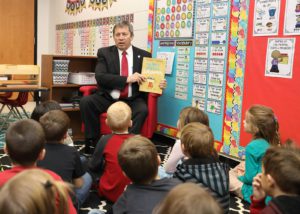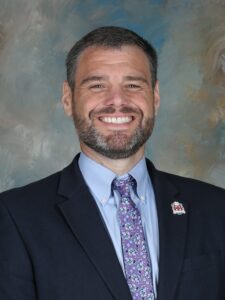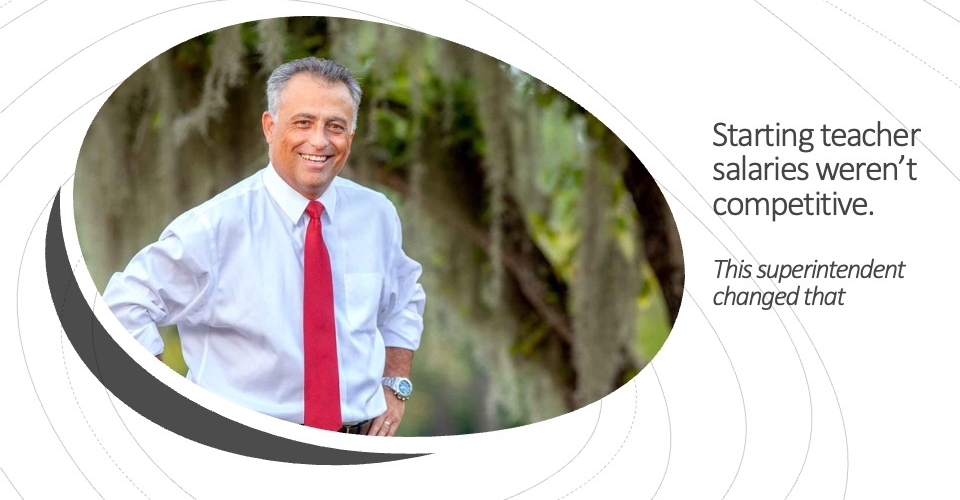The past few years have been nothing short of an eye-opener for educators and district leaders as they’ve battled unprecedented disruptions that have manifested blips in what we know as “traditional” K12 education. From enrollment declines to political intervention—and of course, a global pandemic—superintendents are in the thick of a new era of the superintendency. Now, the question is: How is the 2023-24 school year treating leaders?
Barriers to learning

The pandemic revealed to many the sheer importance of equipping students with reliable education technology and connectivity. Richard Surrency, superintendent of the Putnam County School District in Florida and the state’s 2023 Superintendent of the Year, says it made learning difficult for his students.
“Both students and staff faced challenges after the initial school closures; especially our youngest students who developed foundational learning gaps because they did not receive face-to-face instruction for many months.”
But the most revealing issue he witnessed was the dramatic shift in student behavior, a manifestation of the pandemic most leaders across the country weren’t immune to.
“The challenge was finding the staff and tools to support students and staff with the mental health issues that were experienced throughout the pandemic,” he notes. “Severe student discipline issues increased and attendance decreased for both students and staff.”

Lance Evans, superintendent at the New Albany School District in Mississippi, says discipline is an ongoing conversation in his district, too.
“We set up multiple avenues for students to get help and get in contact with our counselors,” he says. “But the behaviors have changed so much. The things we see in some of our lower elementary grades we’ve never seen before.”
Yet, the greatest challenge that continues to linger in Surrency’s Putnam County is the impact the pandemic has had on their ability to recruit and retain teaching staff.
“This challenge has been our number one focus because we have seen the impact on student learning by not having a face-to-face teacher,” he notes. “We have increased pay for both teachers and non-instructional staff, however, the need to improve the intrinsic motivation for working in our district has been our focus.”
Embracing new leadership styles
These new and exacerbated challenges prompted many leaders to reconsider their career timelines, resulting in a significant turnover in district leadership across the U.S. Those who chose to stick it out witnessed tremendous personal growth and strength necessary in this era of K12 educational leadership.
“The pandemic has made me a more resilient, flexible leader,” says Surrency. “I learned that leaders like to be in control of their environment. However, during the pandemic, I began to realize I could only adapt to an environment of a phenomenon that I had never experienced before. It became obvious that I did not have the answers to address the many challenges that surfaced during this time. As a result, I realized how important collaboration with other leaders is for different perspectives.”
As for Evans in New Albany, he says he had to learn how to be okay with adjusting their academic standards to meet the needs of his students.
“We have high standards,” he says. “But sometimes you have to adjust them to get the students where they need to be so they can have complete access to instruction.”
Additionally, he discovered that there’s more than one way to educate a student effectively. They’ve carried over several strategies brought forth during the pandemic that continue to benefit their students, like opportunities for credit recovery and additional course offerings during the school year.
“It broadened my perspective on ways to help students earn course credit,” he adds.
2023-24: What’s improved?
Though the challenges and obstacles that have arisen over the past few years remain plentiful, these superintendents are spearheading several initiatives to ensure their communities are future-focused and resilient to the challenges brought forth by COVID-19.
School culture, for one, tops Surrency’s list of priorities this school year.
“During the previous school year, our school administrators reached out with a need to build a stronger school culture,” he says. “As a result, my leadership staff worked with the district calendar committee to create monthly early release days to build stronger teams and to just have some fun with their employees.”
They’ve also purchased a research-backed school survey tool that allows staff members to record their perceptions of their school’s culture throughout the year, rather than just once per year.
“School leaders monitor perception data throughout the year and set goals of how to address areas of need,” he says. “We are continuing this initiative during the 2023-24 school year to build on the successes from the past year. As one of my staff has stated, ‘Happy big people means happy little people!'”
More from DA: Substitute teachers are in short supply. What are districts doing to cope?
In New Albany, students can rest assured that their superintendent remains focused on providing equitable opportunities for them to become college- and career-ready.
In a recent interview with District Administration, we discussed their latest partnership with Toyota Mississippi to launch the 4T Academy, a hands-on training program that affords students a direct pathway into Toyota production professions immediately after high school.
“Five years ago we had zero business partners,” he said. “Now, we have around 208 that are established business partners.”
They’re also the only district in the state of Mississippi that’s launched the 4T Academy.
Furthermore, this year, Evans was named Mississippi’s Superintendent of the Year, a testament to the strategies and successful initiatives he and his team have embarked on over the past several years.
“I want us to be seen as not only the premier academic school district in Mississippi but also the premier workforce development school district,” he said during a recent interview. “We have great people doing great things, and I would tell you that we’re very lucky because of the people we have.”
Circling back to the issue that continues to plague districts around the nation, teacher shortages, Surrency, says they’re seeing improvements through their strategic interventions.
“We have developed a ‘Novice Teacher Mentor Program’ that has received national attention,” he says. “Teachers who are in their first three years of teaching receive unlimited support from full-time mentors who are certified teachers. The mentors do not have any classroom responsibility and work with a caseload of 30-40 novice teachers. ”
As a result, they’ve seen retention rates improve from 65% to 93% over the past few years. They’ve also developed a district-wide culture of coaching for all their teachers.
“Teachers are provided time to develop lessons with teachers from other schools and are supported by district-level coaches throughout the year in a side-by-side coaching model.”
Ultimately, Surrency says his goal is to elevate the teaching profession so that teachers feel revered similar to doctors, lawyers and engineers.
“In May of 2022 I had the opportunity to visit schools in the nation of Finland, one of the highest academically achieving nations in the world,” he adds. “There is no teacher shortage there because teachers are viewed as true professionals. They have no standardized tests in Finland because teachers use their professional opinions to determine the progress of their students. Since my trip to Finland, my focus has been to recognize the teachers in my district as very noble and honorable professionals.”









